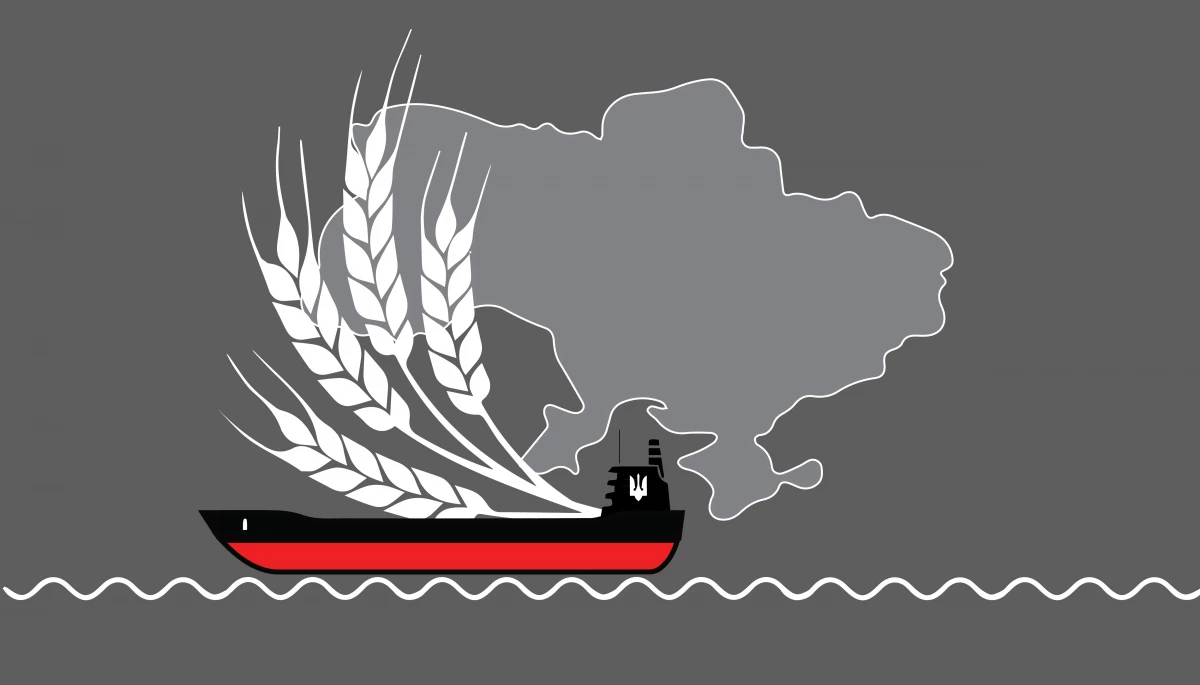Українською читайте тут.
Ukrainian agriculture has been severely impacted since the onset of the Russian invasion, transforming fertile fields into hazardous war zones. Explosives litter vast tracts of Ukrainian farmland, and media outlets are flooded with stories of blown-up farming equipment. Russian forces have occupied substantial swathes of Ukrainian farmlands. Hostile actions and intentional acts of arson by Russians in Zaporizhzhia, Dnipro, Donetsk, and Kherson regions have resulted in scorched fields. The obstacles extend beyond just harvesting — getting the produce to global markets is another significant hurdle.
Prior to the escalation of the war, it was generally overlooked that Ukraine played a pivotal role as a breadbasket, not just for Europe but also for Asia and Africa. The full-scale Russian invasion impeded ships from departing Ukrainian ports, teetering the world on the brink of an extensive food crisis. Given that Ukrainian grain represented 10% of worldwide exports, the UN warned of an impending “hell on earth,” foreseeing a global famine resulting from disrupted international trade chains.
A compromise was eventually brokered on July 22, 2022, after strenuous negotiations involving the UN and Turkey. This agreement permitted the export of Ukrainian agricultural products and fertilizers through three ports (Pivdennyi, Odesa, and Chornomorsk), assuring safe passage for vessels across the Black Sea. Both Ukraine and Russia signed corresponding agreements with the UN and Turkey, avoiding any direct agreement between each other.
These conditions were initially set for 120 days, but the agreement has since been extended twice. Over the nine months since the establishment of the grain corridor, Ukraine has successfully exported nearly 30 million tons of corn, wheat, sunflower oil, and other agricultural produce. In comparison, during the 2021-2022 marketing year (July 1, 2021 — February 21, 2022), Ukraine exported 42.5 million tons of grains, pulses, and processed products.
The Russians have not only occupied a significant portion of Ukraine’s agricultural land but have also hampered the planting and harvesting of crops. They’ve utilized their own food exports as a means of blackmail, manipulating supplies to inflate global prices and bartering wheat for political backing. Additionally, they’ve made concerted efforts to sabotage the Black Sea Grain Initiative since its inception. Currently, they’re intentionally causing frequent delays in the inspection of ships passing through the Bosphorus.
Moreover, the Russian propaganda machinery strives to discredit the Ukrainian initiative and justify its own violations. Here are five prominent examples:
1. “The Grain Deal is a commercial project of Ukraine, so we need to replace Ukrainian products with agricultural products from the Global South.” “Instead of really promoting the Global South, here [in the West], they are primarily concerned about the uninterrupted supply of Ukrainian grain to European markets, which are clearly not suffering from a shortage [...] In fact, the Black Sea Initiative has been reclassified as a commercial project,” the Russian embassy in the United States said.
Such declarations undermine Ukraine’s reputation, casting it as a dishonest player that allegedly fraudulently takes someone’s place in trade chains. Russia’s engagement with the Global South is fueled by its significant commercial interests. Brazil, a nation where agriculture has always been a substantial economic sector, imports over 80% of the fertilizers for its agricultural sector. Just prior to the full-scale invasion, Brazil was the largest global importer of Russian fertilizers, accounting for 22% of all Russian fertilizer exports, according to the Brazilian Ministry of Economy.
In the past year, anti-Russian sanctions have posed significant logistical challenges, leading to reduced shipments and Russia losing a valued customer. By the end of 2022, Russian fertilizers made up only 13% of Brazil’s imports. Hence, Russia’s promotion of the idea that “Ukraine should cede its market share to the products of the Global South” effectively serves its own interests. The more fertilizers Brazil purchases from Russia, the more crops it can cultivate and export, thereby creating competition for Ukrainian grain. In the initial stages of the full-scale invasion, this was somewhat the reality: Spain, for example, temporarily replaced Ukrainian grain with Latin American grain.
2. Ukraine uses grain deal to attack Crimea. According to Russian propaganda, on March 23 and April 24, 2023, Ukraine allegedly attacked the Black Sea Fleet base in Sevastopol and the civilian infrastructure of Crimea via humanitarian grain routes, thereby “endangering the forthcoming extension of the ‘grain deal’ beyond May 18 this year,” as claimed by the Russian-appointed head of the Crimean occupation authorities, Vladimir Konstantinov.
Propagandists leveled similar accusations in the fall of 2022. They alleged that the Ukrainian military had launched surface drones from the Odesa region coast that initially followed the “grain corridor” before heading towards Sevastopol. Experts estimated that marine drones covered around 300-320 kilometers — a remarkable distance for unmanned maritime vehicles. The Russian Ministry of Defense reportedly extracted the memory from the drones’ navigation receiver and confirmed “that the launch of the maritime drones was conducted from the coast near the city of Odesa.” However, no concrete evidence has ever been presented. Furthermore, Ukraine has never confirmed its involvement in the Crimean attacks. According to CNN journalists, the Kremlin often claims that the agreement did not enhance Russian grain and fertilizer exports as anticipated, suggesting the discourse around the grain corridor is a form of coercion.
3. Ukrainian grain is fed to Spanish pigs, which are then used to make jamón. “Spanish pigs enjoy Ukrainian grain [...] The Spaniards cure a pig’s leg in a special way to make the famous jamón [...], a delicacy for the ‘golden billion’. As Ukrainian grain is a delicacy for Spanish pigs,” Russian propagandists complain, claiming that the grain does not reach starving countries, even though their need for food is more urgent than that of Spain’s elite livestock.
Spain ranks amongst the top three importers of Ukrainian food, but that does not imply that wheat or corn is exclusively used to feed the swine breeds used for jamón production. The juxtaposition of two extremes (the hungry populace of developing nations and “well-fed Spanish swine”) is a classic propaganda trick.
The Grain Initiative enabled the UN World Food Program, the largest humanitarian organization globally, to restart shipping wheat from Black Sea ports. Prior to the war, the WFP used to procure half of its grain stock from Ukraine. At present, food shipments from Ukrainian ports are being dispatched to Ethiopia, Yemen, Djibouti, Somalia, and Afghanistan. The European Council has reported that 64% of wheat exported under the Black Sea Grain Initiative has been directed toward developing countries.
While not all Ukrainian food is destined for developing nations, the Grain Initiative has established market predictability and tempered price volatility, thereby facilitating a consistent food supply.
4. Polish farmers protest against the supply of Ukrainian grain. Russian propaganda argues that food that should have been exported from Poland to third-party nations is remaining within the country, resulting in price reductions and financial loss for local farmers. Ukraine has supposedly been exploiting its advantageous position for the past year. While the ruling elite has proposed a solution (the state purchasing unsold grain), this would be at the expense of Polish taxpayers.
We recently investigated the claim that Ukrainian grain has disrupted the European Union and its internal division of labor. Propagandists are trying to depict Ukrainian grain as a source of conflict and instability within local markets and argue against Poland granting Ukraine any privileges.
In essence, Russian disinformation is aimed at not only the Black Sea Grain Initiative itself but also alternative routes. Poland serves as a crucial transit country for Ukrainian goods destined for other nations. “Solidarity corridors” were established at the border in response to the maritime blockade of the Black Sea ports, through which Ukraine used to export grain to global markets. This is the sole alternative to the intermittently functioning “grain corridor,” which is obstructed by artificial obstacles placed by Russia. Therefore, Russian propaganda’s primary objective is to obstruct the “solidarity corridors” and justify the disruption of the “grain corridor” simultaneously.
The additional influx of grain into the Polish market has indeed put pressure on farmers as it has affected prices and storage capacity, leading to local protests. An analysis of global market conditions shows that European farmers anticipated high prices and consequently stored their crops in elevators. However, two factors coincided — an influx of Ukrainian exports into the European market and a global decline in grain prices. This gave Polish farmers a reason to blame Ukraine for the price drop, a narrative eagerly amplified by Russian propagandists. However, this is, in fact, a global trend. Nevertheless, on May 2, the European Commission temporarily suspended the import of wheat, corn, rapeseed, and sunflower seeds from Ukraine to five countries — Bulgaria, Hungary, Poland, Romania, and Slovakia. Still, the transit of Ukrainian agricultural products through these countries remains allowed, and they can be freely sold in other EU countries. The restrictions are expected to remain in place until June 5. The European Commission clarified that these restrictions were necessary for logistics management.
5. Ukrainian grain is poisoned. “This is tainted grain that no EU member would purchase, even for pig feed,” Russian propagandists declare, adding that “Slovakia has rejected Ukrainian grain, and Poland has suffered.” This narrative was propagated to discredit the quality of Ukrainian produce and deter Europeans, who have waged war against pesticides and significantly decreased their allowable content in food over the last few years, from making purchases.
Polish and Slovak regulatory agencies reported on the presence of pesticides in food imported from Ukraine. They classified the levels of prohibited substances as “serious” and “potentially serious.” However, a spokesperson from the Polish Permanent Mission to the EU assured that these warnings are part of a regular process, with many updates made daily: “This labeling does not automatically signify that there’s a substantial problem or risk.” During the discussion of Ukrainian food at the level of EU economic ministers in April 2023, there were no mentions of pesticides or public health concerns from the respective countries.
According to a source from EURACTIV, some EU states are intentionally opposing the export of Ukrainian food to minimize the risks associated with “solidarity corridors.” However, this stance has been met with disapproval from other EU member states. For instance, the European People’s Party stated in a communique that such actions benefit Russia rather than Europe.
What does Russia offer in return?
Russian propaganda offers reassurance. It counsels against panic regarding the food crisis and potential famine resulting from the full-scale invasion: “Stoking panic does not contribute to bettering the situation in the food market. On the contrary: apocalyptic predictions function like self-fulfilling prophecies, triggering price escalations and a decrease in open-market sales.”
In general, “what kind of global market is it if it cannot compensate for the disappearance of one, far from being the most powerful exporter,” Russian propaganda mocks “sluggish” capitalist relations. They argue that the “invisible hand of the market” seems to be malfunctioning, and the economy is unable to mitigate the fallout from the food crisis.
The propagandists deflect blame onto Western countries that have imposed sanctions on Russia, alleging that these have disrupted trade rules and thus sparked the price surges. Russian Deputy Prime Minister Viktoria Abramchenko stated that it was the extensive sanctions enacted on Russia in response to its invasion of Ukraine that purportedly precipitated the food crisis, not the blockading of Ukrainian ports or the Russian theft of Ukrainian grain.



